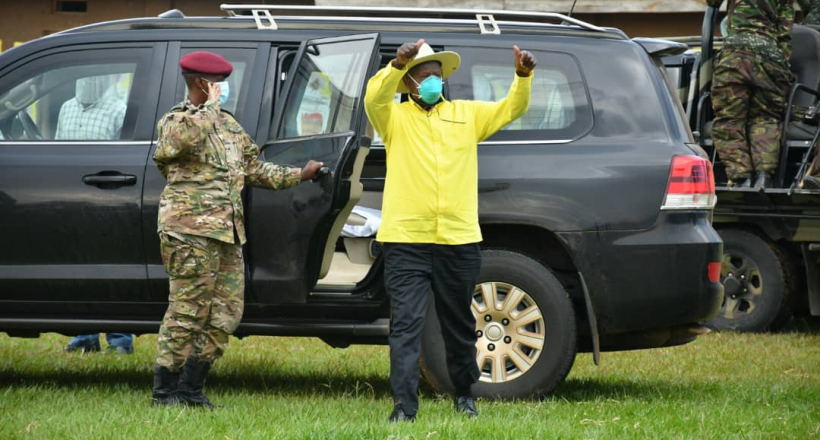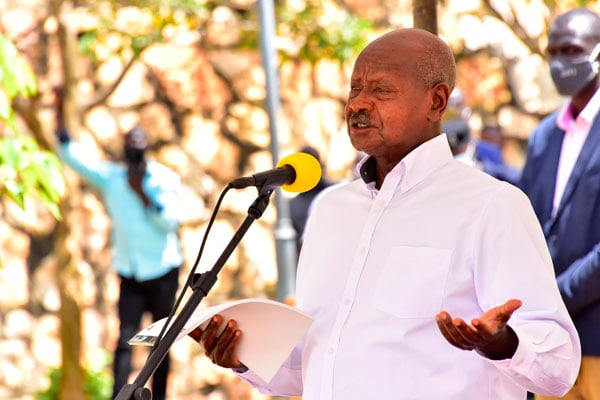Prime
NRM evaluates Museveni’s defeat in Buganda, Busoga

President Museveni gestures upon arrival in Jinja District as he kicked off his electoral campaigns ahead of the 2021 general election on December 3, 2022. PHOTO/ FILE
What you need to know:
- The Monitor has learnt that the surveys were commissioned by the NRM Secretariat in the wake of what was considered the worst performances by Mr Museveni, who was the candidate of the party and the NRM itself in regions in which Mr Museveni and the NRM had until last year’s general election enjoyed immense support.
The leadership of the National Resistance Movement (NRM) has converged in Jinja District for a weeklong retreat to discuss the contents of reports on post-2021 General Election evaluation surveys carried out in Busoga and Buganda regions.
The Monitor has learnt that the surveys were commissioned by the NRM Secretariat in the wake of what was considered the worst performances by Mr Museveni, who was the candidate of the party and the NRM itself in regions in which Mr Museveni and the NRM had until last year’s general election enjoyed immense support.
The NRM’s director for communication, Mr Emmanuel Dombo, had initially told the Monitor that the discussions would centre on Busoga Sub-region alone.
“We did a survey about our support in Busoga and Jinja and we are going to sit with the people who did a survey so that they can give us their findings,” Mr Dombo said.
2021 results
Mr Museveni, who was the NRM’s candidate, was declared winner of the presidential elections with 6,042,898 votes representing 58 per cent of the total votes cast, which is the lowest win percentage posted since 1996 when he first stood for elections.
The 4,078,677 votes, which he bagged in the 2006 presidential elections, representing 59 per cent of the vote had until last year been his lowest percentage win, a performance that was attributed to the poor performance in Busoga and Buganda sub-regions.
Busoga vote
Mr Kyagulanyi of the National Unity Platform (NUP) beat Mr Museveni to the vote in Busoga, bagging 437,059 votes against Mr Museveni’s 404,862.
Mr Museveni won in only three out of the region’s eleven districts. He took Buyende, Kaliro and Namutumba districts, but was beaten in Kamuli, Luuka, Iganga, Jinja, Bugweri, Bugiri, Namayingo, and Mayuge districts, a performance that prompted the party to commission the survey.
Whereas most of the prominent NRM flag bearers comfortably won, the NRM notably lost the Jinja North West Division seat to the Forum for Democratic Change (FDC).
Mr Moses Grace Balyeku, who was the party’s flag bearer and the seconder of the motion that eventually led to the scrapping of the Age Limit law, was defeated by FDC’s Timothy Batuwa.
The NRM flag bearers in the races for Butembe County, Jinja North West, and the Jinja City Woman seat were also defeated. The Jinja City Woman’s seat went to NUP.
This publication has, however, since learnt that the agenda for what Mr Dombo had said would be a “deep, deep discussion” had been amended to include Buganda region.
Buganda vote
Whereas Dr Kizza Besigye had in all his shots at the presidency always taken the vote in Kampala and Wakiso districts, never once did he manage to take the block vote of central region. He always lost to Mr Museveni. The narrative changed with last year’s general election.
Mr Museveni was beaten to the central region vote by Mr Kyagulanyi by a margin of 614,677 votes. Mr Museveni’s got 838,858 votes against Mr Kyagulanyi’s 1,453,535.
The NRM also lost at least 10 parliamentary seats to NUP. Some of the casualties included Mr Museveni’s vice president of 10 years, Mr Edward Kiwanuka Ssekandi, and over six members of the previous Cabinet.
The ministers and ministers of State who lost include Ms Judith Nabakooba, Mr Vincent Bamulanzeki Ssempijja, Mr John Chrysostom Miyingo, Ms Beti Olive Kamya, Ms Nakiwala Kiyingi, and Mr Haruna Kasolo, who were holding the Information Communication Technology (ICT) and National Guidance, Agriculture, Higher Education, Lands, Youth and Microfinance dockets respectively.
The other is the former Government Chief Whip, Mr Ruth Nankabirwa, who is the current Energy minister.
It was not possible to talk to the party’s Secretary General, Mr Richard Todwong, as calls to his known mobile number went unanswered, but he had confirmed in an earlier interview that the party had commissioned a post-election evaluation exercise.
“This is a normal exercise which is aimed at establishing why things went the way they did. Was it due to internal weaknesses or external factors? We need to have answers so that we prepare early. I should, however, say that any serious party does that kind of thing after every election,” Mr Todwong said.
Research
It was not possible to establish from Mr Dombo who conducted the survey, but this publication learnt from other sources in the Secretariat that the surveys were conducted by two different teams each assigned to one of the regions.
The source revealed that the team that conducted the survey in Busoga was headed by Mr Daudi Migereko.
Mr Migereko, who represented Butembe County in Parliament for two decades, was also a member of Mr Museveni’s Cabinet for more than 15 years.
“We did some work and handed over our findings which pointed to harassment of fishing communities on the lakes, poverty, unemployment, and failure to secure markets for the farmers sugarcane at a time when a majority of them had successfully turned to sugarcane growing as some of the factors that could have aff ected the outcome of the election, but the secretariat constituted another team to carry out another exercise,” Mr Migereko said at the weekend.
The exercise in Buganda was headed by the vice chairperson in-charge of the sub-region, Mr Godfrey Ssuubi Kiwanda.
“We hired a professional research firm to do the work. It entailed interactions with party members, flag bearers and other stakeholders. The researchers will then compile a report, which we are going to submit to the Central Executive Committee (CEC) of the party for debate before we can share it with others,” Mr Kiwanda said in a previous interview.
He added that eight different meetings had been held in various parts of Buganda where respondents were asked to give their views on what was considered the key issues in Buganda in the run-up to the elections.
“We asked people to weigh in on how issues such as sectarianism, the brutality of the police, standards of living, evictions and forcing the fi shing communities out of the waters had impacted on the election,” Mr Migereko said




